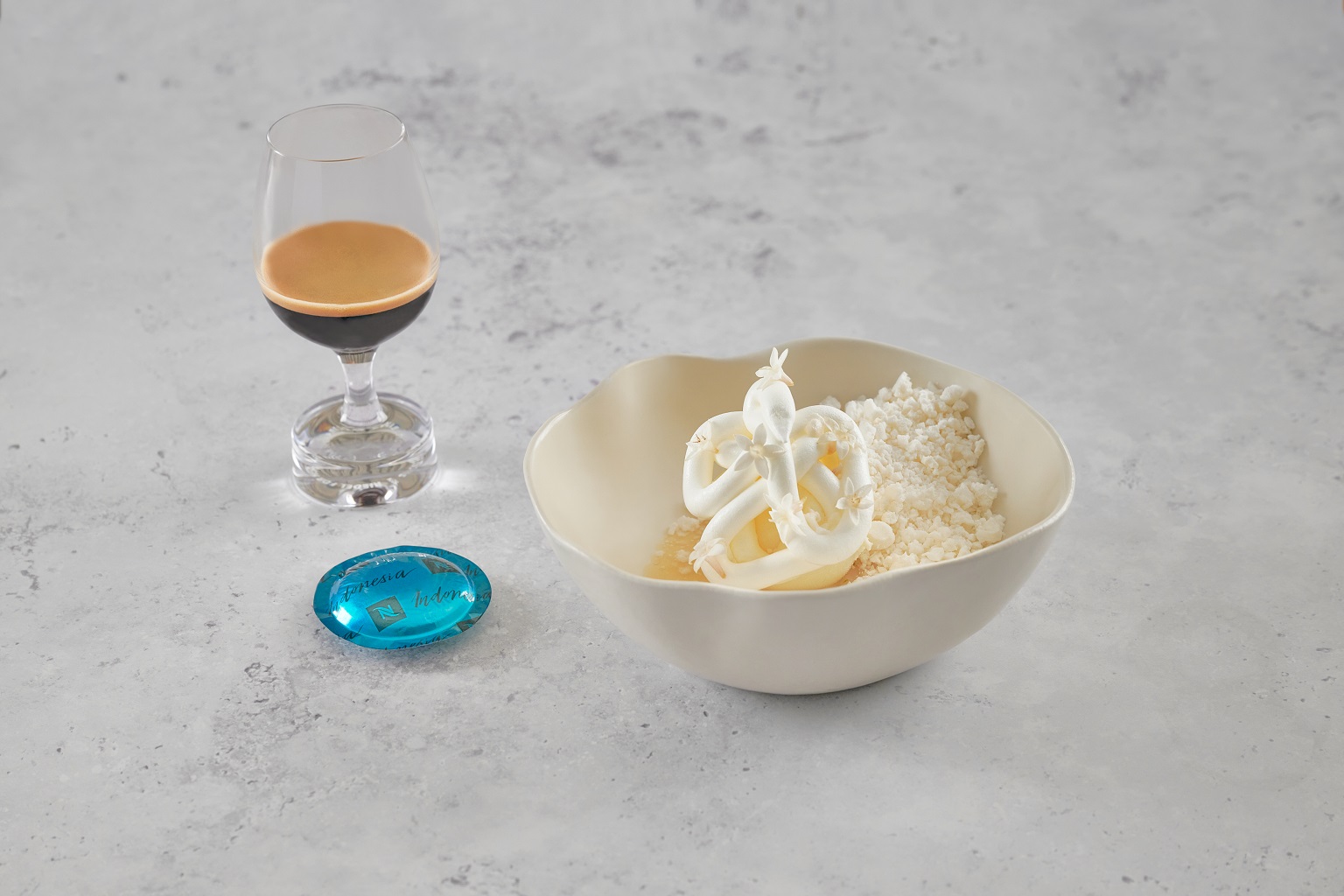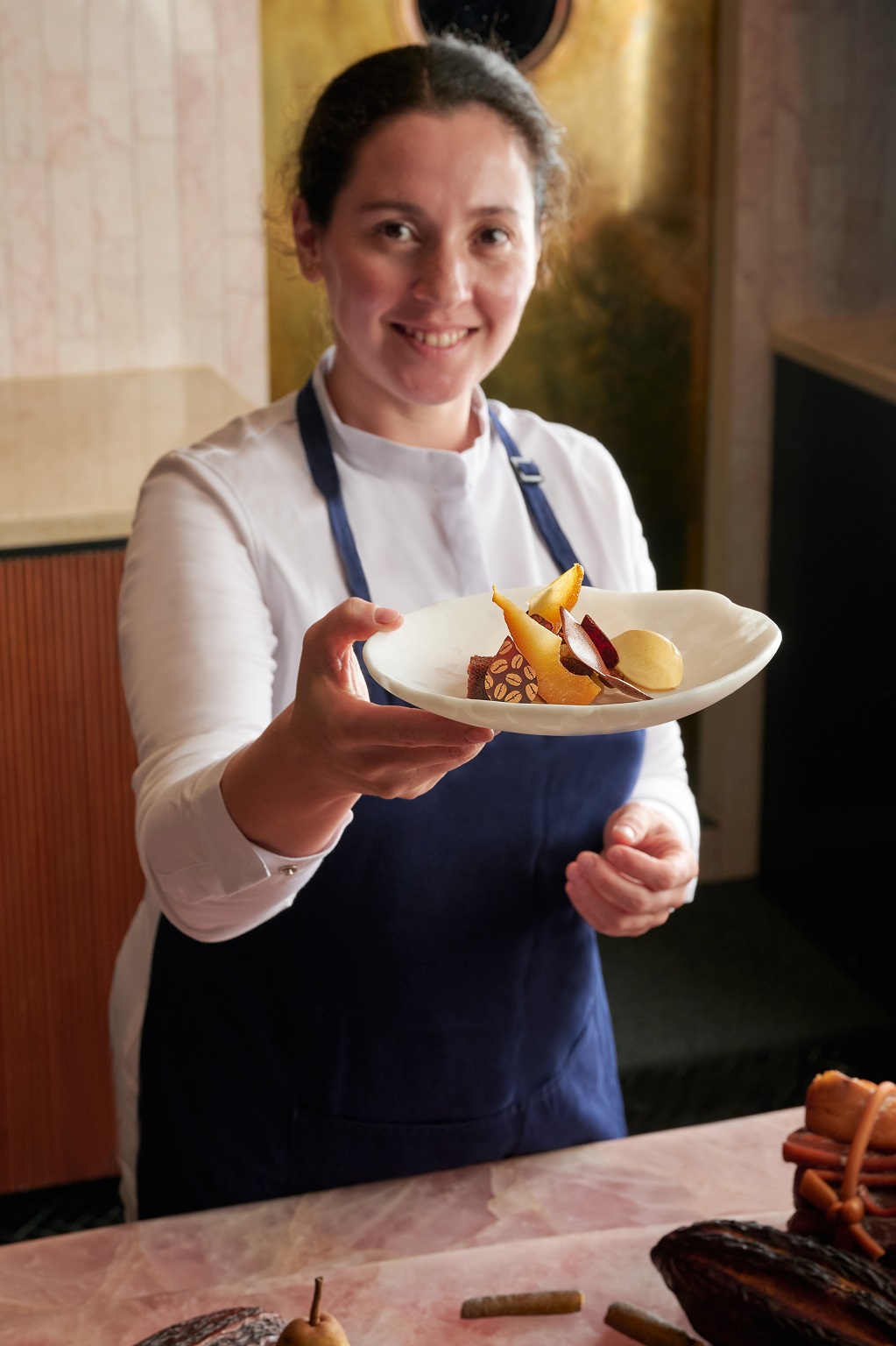BRANDED CONTENT
Minimal waste menus, sustainable coffee at heart: Experience creative eco cuisine by Michelin-starred restaurant chefs
In partnership with Nespresso Professional, chefs from Seroja and Araya are creating zero-waste dishes and giving coffee grounds new life

Seroja chef Kevin Wong preparing his dish of beef shortrib with percik sauce infused with Nespresso Professional Origins Indonesia coffee. He places sustainability at the core of his culinary approach, with a menu inspired by the Malay Archipelago and made with ingredients sourced from South-east Asia. PHOTO: NESPRESSO
Follow topic:
Mr Kevin Wong, chef and owner of one Michelin-starred restaurant, Seroja, has fond memories of his childhood growing up in Port Klang, Malaysia. He would often go fishing with his father in the crystal clear waters of Pulau Ketam, Northport and Westport.
“I remember the amount of fish that we were able to catch, bringing it back to shore and cooking them at the small settlements and restaurants located there,” he recalls.
Years later, Mr Wong was dismayed to learn that unsustainable fishing practices had polluted those same waters, forcing the local fishermen in Port Klang to abandon the settlements.
That became a turning point for the chef, inspiring him to make sustainability a cornerstone of his culinary practice. When he left his position as head chef at Meta Singapore and was planning to establish his own restaurant, he made it a point to prioritise sustainably-sourced ingredients. Seroja, a fine-dining restaurant serving food inspired by the Malay Archipelago, offers a sustainability-focused menu that pays homage to Mr Wong's Malaysian roots.
“We are slowly killing our environment and leaving nothing for the next generations,” he says. “As chefs, we have a responsibility to understand the source of our ingredients and ensure they are harvested in a manner that is safe for both our customers and the environment.”
Leading by example
At Seroja, Mr Wong’s commitment to sustainability extends beyond sourcing for fresh ingredients. Just as important, he believes, are the origins of these ingredients and the care and dedication that local communities put into sourcing for these ingredients.
When creating his menu, he looks for partners that are aligned with his belief of the care at the source of the ingredients – a shared commitment that Nespresso has demonstrated through the Nespresso AAA Sustainable Quality™ Program. The programme helps farmers produce higher-quality coffee while enabling improvements in productivity and the environmental sustainability of farming practices, which in turn leads to the well-being and financial security of farmers.
“I feel that it’s important for diners to witness how sustainability can be part of a dining experience,” says Mr Wong. “We want to show that supporting green practices doesn’t mean compromising the standards expected of a fine dining restaurant.”
In one innovative dessert, he combines freshly churned yoghurt and tropical fruits, such as lychee, longan and rambutan, with natural coffee oil extracted from coffee grounds of Nespresso Professional’s Origins Indonesian blend. The Origins Indonesian blend was cultivated in accordance with Fairtrade standards in close relationship with the local farming community in central Aceh in Indonesia. Through such partnerships with local farming communities, Nespresso is able to provide a premium to the farmers on top of sales to invest in community development projects, such as access for farmers to a pension savings scheme, crop insurance, and youth protection initiatives.
Seroja stays true to its sustainability practices even when operating outside of the kitchen. While looking for a location, Mr Wong considered the building’s green features. The building and restaurant use a combination of rainwater harvesting and private sub-meters for efficient water management. Staff members also take courses on sustainability. Organic food waste is decomposed and reintroduced into the soils of the restaurant’s garden, which provides herbs and vegetables for dishes.

Bringing the sustainability journey full circle, Seroja’s dishes are served on crockery that Mr Wong personally repurposed by mending with gold and giving a new lease of life, a subtle showcase of how sustainability can be incorporated into a Michelin-starred meal in a refined manner.
This attention to detail and commitment to sustainability have not gone unnoticed. For its efforts, Seroja was named Singapore’s first Green Star restaurant by the Michelin Guide, a recognition for its sustainable practices.
The last drop isn’t the last use
Nespresso’s commitment to sustainability extends beyond the kitchen. Its One Pod At A Time recycling initiative ensures that aluminium capsules and used coffee grounds are given a second life. The aluminium from the used capsules is infinitely recyclable – which means they can be melted and reused to create everyday objects such as pens and bicycle frames. Meanwhile, the used coffee grounds are turned into nutrient-rich compost and used by local partners for farming and tree-planting.
A Chilean perspective on waste reduction
Across town at another one Michelin-starred restaurant, Araya, Chilean chef Fernanda Guerrero brings her own sustainable approach to the table.
Growing up working at her parent’s restaurant in San Felipe, Chile, Ms Guerrero learnt early on that respecting nature’s rhythms leads to superior cuisine.
“My mum would go to the market every morning to pick out whatever was fresh and in season for the menu,” she says. “If it wasn’t available, we wouldn’t use it. It taught me that you don’t need extra or unnecessary ingredients – just the best of what’s available at the right time.”

She recalls peeling corn for a traditional Chilean dish called humitas during corn season, and the feeling of satisfaction knowing that she was cooking “something special that could only be made for a short time”.
“It was a reminder that nature provides what we need, and when you cook with care and respect for the ingredients, it shows in the food.”
This philosophy translates to a minimal-waste approach at Araya, which Ms Guerrero runs with her partner, Francisco Araya. Her innovative techniques ensure that every part of an ingredient is utilised. For instance, a pigeon dish is served with the jus cooked down from the bones of the same bird, while the legs are made into a ragu filling for a pumpkin brioche, served with aged cacao sauce.
Like Mr Wong, Ms Guerrero has found an unexpected ally in her sustainable efforts: coffee grounds. Through her partnership with Nespresso Professional, she has put her own imaginative spin on sustainable creations, thanks to the versatility and creativity afforded by the wide range of Nespresso Professional blends.
In a dessert called Mar y Tierra – which translates to mean sea and land – she combines chocolate, seaweed from Chile and coffee grounds from Nespresso Professional's Brazil Organic blend, as an homage to her hometown situated between the valley and the beach.

Each of the single-origin coffees in the range originates from a single country and boasts a unique aroma and taste – something she appreciates greatly as a chef.
“With the Brazil Origins selection, coffee is sourced from the Cerrado region, known for its nutty and chocolatey coffees, as well as the South Minas Gerais region, which brings a touch of fruitiness and acidity. The complexity of these coffees showcases the diversity of Brazil as an origin, and enables me to create many different desserts like coffee-infused pears, ganache, and even ice cream,” she explains.
Like Mr Wong, Ms Guerrero hopes to dispel the notion that sustainability in fine dining comes with a compromise in quality or creativity.
“Sustainability encourages us to innovate, finding new ways to use ingredients fully and without waste – much like what Nespresso does through the Nespresso AAA Sustainable Quality™ Program to ensure a continued supply of high-quality coffee while improving the livelihoods of farmers and their communities, and protecting the environment,” she says. “Through my food, I want diners to understand that sustainable dining can be exciting and flavourful, while being respectful to the environment.
“More importantly, being sustainable honours the people, land and traditions behind the ingredients, helps us maintain a deeper connection to the food we create, and in the long run, ensures that we can continue to offer meaningful dining experiences for generations to come,” she adds.
The coffee of choice for chefs
Nespresso Professional is the coffee of choice for many world-renowned fine-dining chefs. More than half of Michelin-starred restaurants and over 70 per cent of 4- and 5-star hotels in Singapore use Nespresso Professional coffee machines.

The Nespresso Professional Origins range exemplifies the brand’s commitment to quality, sustainability and close partnerships with farming communities through the Nespresso AAA Sustainable Quality™ Program, a sourcing system co-created with the Rainforest Alliance in 2003. The aim of the programme is to deliver consistently high-quality coffee and provide an ecologically and socially better environment for farmers.
Each of the single-origin coffees in the range comes from a single country and reflects the distinctive characteristics of its source, giving each coffee its own unique aroma and taste. The addition of the Fairtrade-certified Origins Indonesia coffee to this range deepens the demonstration of care towards coffee sourcing practices, both from ethical and sustainable standpoints.
The company’s dedication to sustainability and gastronomic experiences has led to partnerships with chefs from Michelin-starred restaurants in Singapore. Nespresso has been the coffee partner of the Michelin Guide Ceremony since 2016.
To learn more about how Nespresso partners with renowned fine dining chefs to bring great gastronomical experiences with sustainability in mind, visit: Professional Coffee & Coffee Machines: Fine Dining | Nespresso™ Pro SG.


